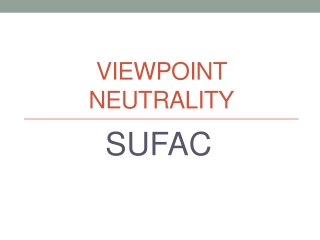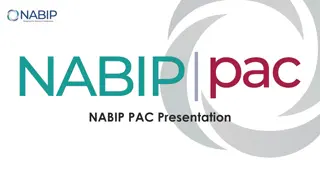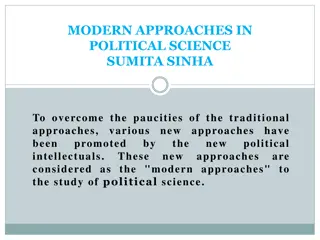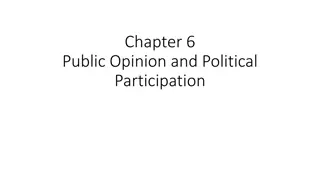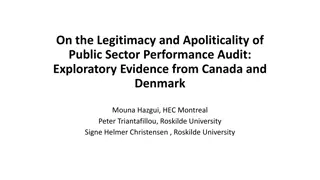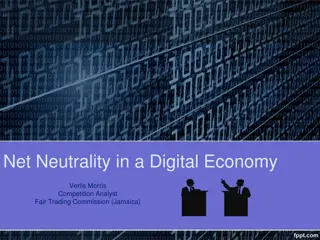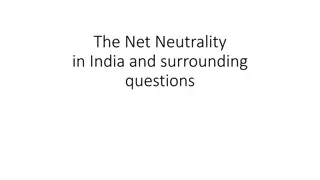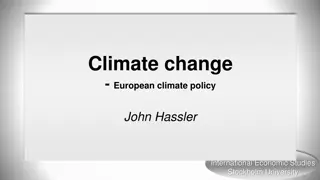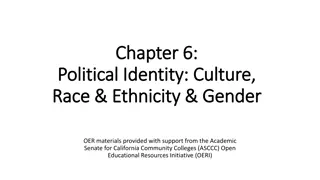Understanding Viewpoint Neutrality in Student Fee Allocations
Explore the concept of viewpoint neutrality in student fee allocations, focusing on the U.S. Supreme Court's decision in Southworth v. Board of Regents. Learn about the constitutional mandate for public institutions to remain neutral in funding decisions and the history behind the Southworth case. D
3 views • 32 slides
Understanding Climate Neutrality and Roadmaps for Achieving it at a University
Exploring the concept of climate neutrality and the development of roadmaps to achieve it at a university, focusing on the efforts of JKU and its Energy Institute towards CO2 reduction and reaching climate neutrality by 2030. The roadmap involves stakeholder engagement, defining system boundaries, u
1 views • 19 slides
Understanding NABIP PAC: Political Action Committee Overview
Federal law prohibits direct financial contributions to federal candidates, hence organizations like NABIP establish Political Action Committees (PAC) to advocate for political priorities. Learn about NABIP PAC, its accounts, eligibility criteria, contribution rules, and how funds are utilized. Disc
1 views • 14 slides
Ireland's Neutrality in World War II
Despite being divided into North and South, with Northern Ireland part of the UK, the Free State of Ireland remained neutral during World War II. Eamon DeValera, leader of Fianna Fail, chose neutrality, which impacted Ireland's relationship with both the Allies and the Axis powers. Learn more about
6 views • 9 slides
Contrasting Concepts in Political Science: Normative vs Descriptive Approaches
Normative and descriptive concepts in Political Science explore contrasting viewpoints on how things should be versus how they actually are. While normative claims focus on value judgments, descriptive claims deal with facts. These concepts complement each other by providing both theoretical and pra
0 views • 10 slides
Modern Approaches in Political Science: Overview and Characteristics
Explore modern approaches in political science pioneered by intellectuals to address the limitations of traditional methods. These approaches emphasize empirical data, interdisciplinary study, and scientific methods to draw conclusions beyond political structures and historical analysis. Key modern
1 views • 13 slides
Interdisciplinary Approach in Political Science and Its Relation with History
The need for an interdisciplinary approach in political science emerged in the 20th century to study political issues from various social science perspectives. This approach emphasizes the interrelation between political science and other disciplines like history. History provides the foundation for
0 views • 23 slides
Institutionalism and Methodological Issues in Political Science
Institutionalism is a foundational concept in political science, emphasizing the study of governing institutions and their role in shaping political behavior. It explores inductive and deductive approaches to research, highlighting the significance of empirical evidence and theoretical assumptions.
0 views • 19 slides
State-Sponsored Interreligious Dialogue in the Middle East: A Political Analysis
This research delves into the growth of state-sponsored interreligious dialogue initiatives in the Middle East between 2000-2020. It explores the political significance, impact on relations between political and religious authorities, and implications for religious practices in the region. The thesi
0 views • 23 slides
Understanding Gramsci's Political Theory and its Relevance Today
Gramsci's political theory, focusing on concepts such as hegemony, historical bloc, and the role of intellectuals, offers valuable insights into contemporary political challenges. Explored through the lenses of Prof. Ken Spours and Stuart Hall's analytical tradition, this analysis sheds light on Con
0 views • 13 slides
Evolution of Citizenship in Liberal Democracy
Citizenship within liberal democracy entails equal rights, duties, liberties, and constraints for individuals within a political community. The entrenchment of civil and political rights has shaped the struggle for membership and participation in political communities. Civil rights, essential for in
1 views • 11 slides
Understanding Political Theory through a Contextual Approach
Exploring G.H. Sabine's perspective on political theory through a contextual approach, emphasizing the importance of historical context and societal influences. Sabine argues that while political theory evolves with its contemporary politics, it should be analyzed within its specific time and social
0 views • 9 slides
Understanding Public Opinion and Political Participation
Public opinion and political participation are influenced by various factors such as financial interests, family, education, and party identification. Measuring public opinion accurately through scientific surveys is crucial in a democracy. Traditional participation methods like voting and civic vol
5 views • 7 slides
Understanding Public Sector Performance Audit in Canada and Denmark
The study explores the legitimacy and apoliticality of Performance Auditing (PA) in Canada and Denmark, focusing on how Supreme Audit Institutions (SAIs) maintain political neutrality and legitimacy. Existing knowledge points to the inherent political nature of PA and the challenges SAIs face in pre
4 views • 9 slides
Enhancing Land Degradation Neutrality Targets in Lebanon's National Action Programme
Integrating LDN targets into Lebanon's National Action Programme, led by Dr. Chadi Mohanna, aims to align the NAP with the UNCCD's 10-Year Strategy, set national targets for Land Degradation Neutrality, and implement measures to combat land degradation aggravated by climate change. The project focus
0 views • 23 slides
Maintaining Neutrality as a Facilitator in Collaborative Meetings
When a facilitator maintains neutrality in collaborative meetings, it allows all voices to be heard, encourages collective intelligence, and fosters fairness and inclusivity. Developing neutrality involves self-reflection, seeking diverse perspectives, questioning assumptions, and practicing empathy
0 views • 16 slides
Advancing Towards Carbon Neutrality in the EU Fisheries Sector
The EU fisheries sector is making strides towards carbon neutrality, with a focus on reducing greenhouse gas emissions and adopting energy-efficient technologies. Efforts include decreasing CO2 emissions from fishing fleets, implementing regulations for vessel capacity, and exploring innovative equi
0 views • 13 slides
Analysis of Facebook Affordances for Political Parties During the 2014 EU Elections
Research by Karolina Koc-Michalska and Darren Lilleker explores how political parties across 28 countries utilized Facebook affordances during the 2014 European Parliament elections. The study investigates the impact of social media on voter behavior, community building, and political engagement. Fi
0 views • 22 slides
Understanding Political Beliefs and Behaviors: A Comprehensive Overview
Explore the formation, evolution, and transmission of political beliefs, as well as the impact of differing beliefs and behaviors on the political process. Delve into platform issues, political affiliations, and their influences to gain a deeper understanding of the political landscape.
1 views • 53 slides
Understanding Nationalism in Political Science
Nationalism, a complex concept, defines the nation as the fundamental unit of political rule. It encompasses a mix of objective and subjective factors, including cultural, ethnic, and political traits. The definition of a nation is subjective, based on how its members perceive themselves as a distin
0 views • 27 slides
Understanding Net Neutrality in a Digital Economy: A Comprehensive Analysis
Explore the concept of net neutrality in the digital economy through an in-depth analysis of how ISPs discriminate, the Jamaican example, arguments for and against, and key issues surrounding online equality and regulation.
0 views • 14 slides
Understanding Political Science: A Comprehensive Overview
The study of political science delves into various aspects, from the pursuit of the good society to the exercise of power and the allocation of resources. It encompasses specialized fields such as American politics, international relations, comparative politics, public policy, and political philosop
0 views • 5 slides
2024 Election Judge Training: Code of Conduct, Neutrality, and Polling Place Setup
Explore the essentials of election judge training for the 2024 elections, covering the code of conduct, maintaining neutrality in the polling place, and details on polling place setup and roles. Understand the oath, duties, and responsibilities of an election judge, emphasizing impartiality, profess
0 views • 55 slides
Understanding Net Neutrality: Perspectives and Debates
Net Neutrality is the principle that Internet Service Providers (ISPs) should treat all Internet communications equally, without discrimination based on user, content, or source. Various actors hold different perspectives on this principle, with arguments for and against its implementation. Proponen
0 views • 17 slides
Political Development Theory and Practice: An Overview
Political development refers to the evolution of institutions forming the political power system of a society. Initially popular in the 60s-70s to describe political change, it later fell out of favor for being Euro-centric but has since regained significance. The concept encompasses aspects like po
0 views • 13 slides
Political Party Funding Act 2018 Overview
The Political Party Funding Act of 2018 in South Africa aims to enhance multi-party democracy by regulating the funding and donations to political parties. It establishes the Multi-Party Democracy Fund funded by private sources, alongside the existing Represented Political Party Fund. The Act prohib
0 views • 17 slides
Understanding Political Party Funding Act of 2018
The Political Party Funding Act of 2018 regulates the funding of political parties in South Africa, ensuring equitable and proportional funding for parties participating in national and provincial legislatures. The Act defines various terms such as donations, foreign persons, and political parties,
0 views • 42 slides
Evolution of Political Ideas and Influences on American Founding
In the history of politics, major ideas like laws of nature, unalienable rights, divine right of kings, social contract theory, and rights of resistance have influenced the American founding. Various traditions such as Judeo-Christian, English common law, Enlightenment, and republicanism played a si
0 views • 68 slides
Understanding Net Neutrality in India: Key Concepts and Regulations
Net neutrality in India ensures equal access to online content without discrimination. Telecom Service Providers are regulated to prevent differential tariffs for data services. Different stakeholders like consumers, TSPs, OTT service providers, and the government play crucial roles. Net neutrality
0 views • 10 slides
Understand PAS 2060:2014 - Specification for Carbon Neutrality
Explore PAS 2060:2014, a standard for demonstrating carbon neutrality through emission offsetting and reduction. Learn about carbon neutrality, offsetting, benefits of the standard, and the significance of a Carbon Reduction Plan in making a positive environmental impact.
0 views • 8 slides
European Climate Policy and Transition to Climate Neutrality
European climate policy focus on sharp emission limits, socially acceptable transition measures, and global involvement for a successful transition to climate neutrality. Key elements include ETS, emission allowances, and Fit for 55 proposal to achieve climate neutrality by 2050.
0 views • 19 slides
Explore the Fascinating World of Political Science
The Department of Political Science offers a range of courses, delving into topics such as political theory, international relations, and governance. Understand the distinction between politicians and political scientists, and explore branches of political science like public administration and huma
0 views • 16 slides
Understanding Political Identity: Culture, Race & Gender in Society
Explore the intricate aspects of political identity, culture, race, ethnicity, and gender in society. Discover how individuals shape their identities and the impact of political mobilization on society. Uncover the significance of political socialization and the role of societal institutions in shap
0 views • 20 slides
Joint Call for Proposals - Positive Energy Districts and Neighbourhoods for Climate Neutrality
This joint call for proposals, facilitated by JPI Urban Europe, focuses on developing Positive Energy Districts and Neighbourhoods to address climate neutrality goals. The initiative aims to enhance knowledge and support large-scale implementation by 2025, aligning with Horizon Europe's mission for
0 views • 14 slides
Evolution of Political Protests in Modern Russia: A Historical Overview
This article provides an in-depth analysis of the evolution of political protests in modern Russia from 1990 to present. It discusses the attitude of Russian journalists towards protests, basic concepts of political protest in modern political science, myths surrounding protests in Russia, and the f
0 views • 24 slides
Government Advertising Guidelines and Public Service Neutrality
Government Advertising Guidelines and the concept of political neutrality in public service are essential for maintaining transparency, accountability, and public trust. Te Kawa Mataaho and Cabinet Office play pivotal roles in ensuring government communication aligns with the public interest. Unders
0 views • 15 slides
Impact of Political Stability on Equity Trading Costs of Cross-Listed Firms
The research explores the relationship between political stability and equity trading costs of cross-listed firms, highlighting the impact of political institutions, liquidity, and investor protection. It delves into the importance of factors like quality of political institutions, transparency, and
0 views • 24 slides
Interdisciplinary Relationships in Political Science
Political science and history share a symbiotic relationship, with history providing the foundation for political analysis while political science influences historical events. The contribution of economics to political science is evident in how economic conditions shape political ideologies and pol
0 views • 12 slides
Understanding Political Theory: Definitions, Differences, and Significance
Political theory encompasses systematic explanations of political phenomena, distinct from political thought which involves ideas and opinions of philosophers. It constitutes both political science and philosophy, addressing both empirical and evaluative aspects. The significance lies in finding sol
0 views • 7 slides
Remedial Measures Implemented by Indian Political Party
Explore the impactful remedial measures taken by a prominent political party in India through a collage presentation. Delve into the functions of political parties, understanding partisanship, the necessity of political parties, and more. Gain insights into the significance and role of political par
0 views • 23 slides
